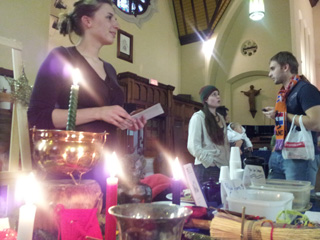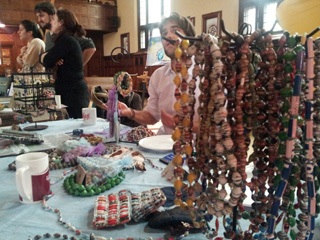A holiday smorgasbord
I’m not sure if it was all the Christmas songs on the radio, or repeated showings of Adam Sandlers’ 8 Crazy Nights on TV, or simply that my decision-making had been stunted by the contagious holiday cheer, but when I found out Concordia’s Multi-Faith Chaplaincy was hosting their third annual Holidays Around the World event at the Loyola chapel, I was curious.
Inside, the chapel was a marketplace of cultures. Holiday jingles reverberated off the chapel walls, sung by a rotation of musicians from each table. On the right, students representing the Christian, Jewish and Muslim faiths tabled side-by-side. Touched by how the holidays bring different traditions, religions and faiths together at Concordia, I paused to take in the moment, which was broken by my growling stomach. So I followed my nose to get a closer look at what the three major world religions had to offer in terms of munchies.

First up was the Muslim Students’ Association’s table. I was immediately attracted to the baklava and samosas. A large silver kettle of Moroccan tea and a fleet of beautifully decorated cups lined the table.
Curious about the other dishes, I asked Murtazane, a Concordia molecular biology student, to give me a tour. Pointing to a bowl of a fruit-punch-like shake, Murtazane told me that it was a popular Ramadan dish called Fruit Chaat. Excited, I pointed inquisitively to a bowl of large dark raisin-like fruits — only to learn they were just dates.
In an attempt to save face, I asked him about a jug of pinkish creamy liquid. But I gulped three glasses before learning the answer. Faluda (it turned out) is made with condensed rose petals and milk. Just as I reached for another baklava, I realized the musician was singing Chanukah melodies that I hadn’t heard in many years.
Hillel Concordia’s table was decorated with a Chanukah menorah (a candelabra that marks the holiday’s eight days) and dreidels (a four-sided spinning top).
Drooling over the potato latkes (pancakes) and sufganiyot (sugarcoated jelly doughnuts that should not be confused with anything Tim Hortons sells), I asked Hillel’s young rabbi Ben Vago the secret behind cultural food.

He explained the Eastern European origins of the holiday food and the important role food played in uniting a community together during festivities.
Unconsciously bobbing my head to three Christmas carollers, I noticed right across the lights of the menorah was another set of candles. Walking over, I read the table’s sign, Concordia University’s Pagan Society. Speaking to Elise, the student president of the club, she debunked many myths and misconceptions that the general public holds for neopagans.
The group is commemorating Yule. This ancient Nordic holiday celebrates the Winter Solstice’s darkness as a symbol that the sun will be reborn to illuminate the world. I tried their Yule Moon cookies which were a delicious blend of sugar, butter and vanilla. Also lining the table was chocolate fudge and little squared acorns that made me think of Alvin and the Chipmunks. I washed it all down with an old pagan recipe of ginger tea.

Two other tables remained and, luckily for my bloated stomach, there was no food provided. The first was dedicated to the Baha’i faith, one of the youngest religions in the world today. The other table stood out from the rest of the bunch because it did not present a denomination. Beads of Awareness is a social business raising funds for Ugandan communities by selling jewellery.
Before leaving, and on the verge of exploding from all the food mixed up in my stomach, I bumped into Rev. Ellie Hummel, the Multi-Faith Chaplaincy Coordinator. Her face was a beacon of delight. “I love that so many different people came together in this community space. It’s a good way to honour our history and acknowledge our current growing diverse community.”
How do you spend your Winter Solstice? Do you sit around the Christmas tree, carolling with family and friends? Or do you enjoy potato latkes and recite the Chanukah prayers while lighting the menorah? Let me know.

